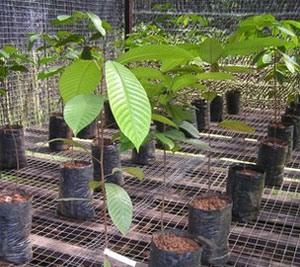Carbohydrates help plants fight drought
High levels of unstructured carbohydrate compounds (NSCs) - including sugar and starch in plants - can help tropical plants extend their survival by 17 days in more severe droughts . , according to research by an international team of scientists.
 In many previous plant physiological studies, NSCs have been shown to play an important role in plant resilience in drought conditions.
In many previous plant physiological studies, NSCs have been shown to play an important role in plant resilience in drought conditions.
In the new study, scientists observed the reaction of plants by planting 1,400 seedlings of 10 different tropical plants and dividing them into 2 groups. They nourish the first group of plants under low light conditions before exposing them to sunlight, while the second group of plants is the opposite, ie originally planted in the sunshine and then moved into the dark.
Because plants need sunlight to photosynthesize and produce chemicals for growth, the second group of plants showed a marked decrease in NSC, helping experts compare their survival ability compared to the first group of plants ( inherently normal NSC content). Clearly, the result is that the group of plants stocking more NSCs can maintain their body water longer than the rest of the group.
According to the researchers, the ability to store carbohydrates is different among all plants. This can help biologists and the environment determine which plants are more tolerant of dry weather, thereby supporting forest restoration to cope with climate change.
- Some plants make drought worse
- Learn about carbohydrates, which everyone needs to know
- Diet reduces heart disease
- Scarcity of food has 'super trees'
- The new active ingredient protects plants from drought, despite climate change
- The highest tree species in the world are threatened
- Eating more refined carbohydrates can be associated with early menopause
- Genetically modified plants withstand drought
- A few facts about anti-drought in plants
- Caffeine, carbohydrates improve athletic performance
- Canada creates good drought tolerant plants
- Human anti-drought weapons are here
 Why do potatoes have eyes?
Why do potatoes have eyes? 'Tragedy' the world's largest carnivorous life: Death becomes ... public toilet
'Tragedy' the world's largest carnivorous life: Death becomes ... public toilet Tomatoes were once considered 'poisonous' for 200 years
Tomatoes were once considered 'poisonous' for 200 years Detecting microscopic parasites on human face
Detecting microscopic parasites on human face